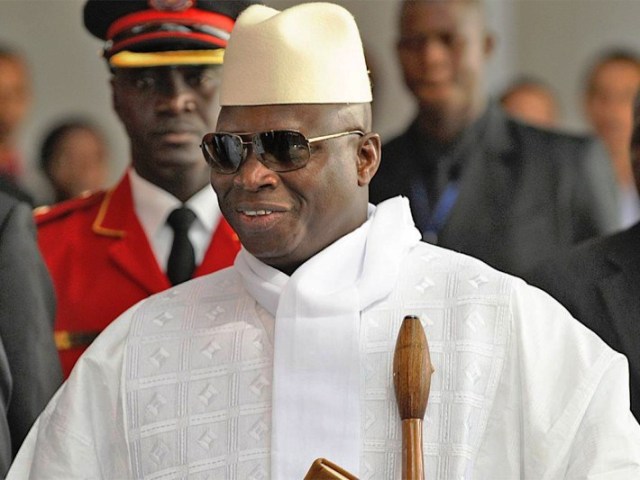Editorial
The Gambia And Democracy In Africa

It is no longer news that the political rascality of the former embattled President of the Gambia, Mr. Yahya Jammeh had put his country and the entire continent on edge, as over 45,000 Gambians fled the country for fear of being caught in the crossfire of the political violence that stared the citizens in the face.
Having ruled the country for 22 years, and apparently not content with power, Jammeh again tested his popularity at the December 1, 2016 presidential polls and lost to the leader of the opposition, Mr. Adama Barrow. His decision to still remain in office, after initially conceding defeat and congratulating the winner of the polls, ostensibly plunged the country in avoidable political crisis.
Events followed one another in quick succession. Jammeh coerced the Parliament to elongate his tenure by three months, contrary to the country’s Constitution; directed the Armed Forces to take over the Independent Electoral Commission; and declared a state of emergency in the country, which ultimately placed the country on a war path. These measures were intended to further entrench him in power, contrary to the wishes and aspirations of the Gambians.
It, however, took the intervention of the international community led by the Economic Community of West African States (ECOWAS) to snatch the country from the jaws of a Civil War. Leaders of ECOWAS met with Jammeh twice and offered him opportunities to demonstrate statesmanship and step aside. Twice, he rejected the peaceful overtures, a situation which compelled the regional body to give him an ultimatum.
Incidentally, Jammeh spurned overtures from the African Union (AU), the United Nations (UN) and the global community to quit honourably. What apparently broke the carmel’s back and swayed him to surrender power were the forces already amassed against him by ECOWAS, and the fact that his long-time deputy, his commanders and soldiers had deserted him and vowed never to defend or protect him. On a daily basis, Jammeh was more and more isolated by his friends and trusted allies.
And sensing that the game was up, as the odds were overwhelmingly against him, the former Gambian President had no option but to capitulate on the night of Saturday, January 21, 2017 and proceeded on self exile in Guinea. This was after Mr. Barrow was sworn-in as President in Dakar, the Senegalese capital in the presence of several African leaders on January 19, 2017, with the tacit support of virtually the whole world.
It is on record that for the 22 years Jammeh ruled the country, Gambians groaned under dictatorship and autocracy. The opposition and the media were muzzled. Several politicians were imprisoned on trump up charges. Pro-democracy groups were haunted and hounded. Life became unbearable for most Gambians. Development of the country was a far cry. And series of elections, which made it possible for him to perpetuate himself in office, were grossly flawed. Like his predecessor, Mr. Dauda Jawara, who ruled the country for 29 years, he proved beyond doubt that he was an unrepentant dictator.
These, perhaps, were the circumstances that informed the rejection of Jammeh at the December 1 polls by Gambians. And with his final ouster, last Saturday, it is, indeed, a new dawn for The Gambia.
The Tide strongly believes that the Jammeh’s experience should serve as a big lesson and litmus test for other sit-tight African leaders who refuse to respect the will of their people. The truth is that the embattled former President would have salvaged a measure of respect and honour for himself if he had bowed out when the ovation was loudest. Indeed, the sit-tight syndrome, going by the realities of today, is now old-fashioned and must give way for unfettered democracy to flourish in Africa.
It is against this backdrop that we commend the Gambian people, the Army and the judiciary for standing firm behind the new President during the trying moments, and at the same time condemn the Gambian Parliament for extending Jammeh’s tenure and also endorsing an emergency rule for him. With the turn of events, it simply shows that evil like every injustice under the sun, has expiry dates. The prevarications and grand standing exhibited by the former President and his stooges, intended to truncate the people’s collective will, at the fullness of time, fizzled out. This is a victory for democracy.
This is why the global community, particularly ECOWAS deserves praise and commendation for its united and principled stand in ensuring that the seeds of democracy are sown in The Gambia. Indeed, it is heart-warming that Jammeh’s ambition was not allowed to override the interest of the generality of the Gambian people.
For over half a century, democracy had eluded the country, as Gambians had moved from one spectre of dictatorship and backwardness to the other. Indeed, this is the time for President Barrow to break this cycle, make a difference and restore the country to the path of development and prosperity, so that the people can start enjoying the fruits of democracy for the first time.
Editorial
As NDG Ends Season 2

Editorial
Beginning A New Dawn At RSNC

Editorial
Sustaining OBALGA’s Ban On Street Trading

-

 Education5 days ago
Education5 days agoElga boss tasks law students on academics strides
-

 News1 day ago
News1 day agoAmend Constitution To Accommodate State Police, Tinubu Tells Senators
-

 Politics1 day ago
Politics1 day agoSenate Urges Tinubu To Sack CAC Boss
-

 News1 day ago
News1 day agoDisu Takes Over As New IGP …Declares Total War On Corruption, Impunity
-
Business1 day ago
President Tinubu Extends Raw Shea Nuts Export Ban To 2027
-
Business1 day ago
Crisis Response: EU-project Delivers New Vet. Clinic To Katsina Govt.
-

 Business1 day ago
Business1 day agoPENGASSAN Rejects Presidential EO On Oil, Gas Revenue Remittance … Seeks PIA Review
-
Business1 day ago
FG Pushes Cassava Bioethanol Drive To Boost Industrial Growth

